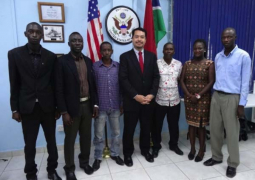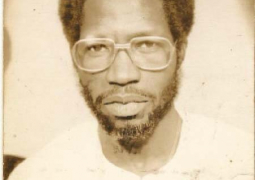
"Moderation in Islam" is composed of series of articles that were written following the September 11 incident and its link with radical Islamic groups.
The book is divided into three chapters. In Chapter 1 entitled "The Status of moderation in Islam" Khaled Abolfazl examines the role of Al-Qaeda's theological branch in terrorist acts. Chapter 2 is composed of commentaries by eleven other writers about Abolfazl?s article and in Chapter 3 Abolfazl has responded to their remarks.
After the September 11 attacks western analyst have zoomed in on the theology in Islam and conflict of liberal values with Islamic values. The reason for such approach versus Islam and Muslims and their focus on the theology of Osama Bin Laden and several other fundamental Islamic groups as propagators of such attacks. Abolfazl refers to these groups as puritan Muslims and maintains that according to the doctrines of these groups of Muslims Islam is the only correct method of living and must be followed strictly by Muslims without paying attention to the right of non-Muslims. Such an approach to Islam leads the puritans to believe that they are superior to others and that the others are heathens, hypocrites and tyrants.
In a historical survey Abolfazl has examined the method of formation of radical groups including Al-Qaeda. He says the root of their doctrines lies in wahabism and adds that from the beginning of the twentieth century and especially after the increase of the price of oil these extremist groups have found the chance and money to flourish and propagate their doctrines. Aggresive Wahabi puritans transcribe Qur?anic verses word by word without paying attention to their historical meaning which ends with a monopolistic approach to Islam in which there is no moderation {p.23}.
Abolfazl says these groups have flourished because of illegitimate sources of emulation. He says control of religious endowed properties by Islamic governments which were formerly owned by jurisprudents has made the clerics servants to government and that they have lost their independence. Such an act has reduced the legitimacy of theologians, opened a big gap between the sources of emulation and their followers and has provoked real crisis in Islam. As a result radical groups like Al-Qaeda have succeeded in representing themselves as the only legitimate Islamic sources of emulation. Abolfazl considers them to be side groups who have always been a minority and believes that will gradually be destroyed.
He says the radical interpretation of Quran by these groups is not the only interpretation of Islam and it is possible and necessary to make moderate interpretation of Qur'anic verses. For that reason he quotes different verses from the Quran which call for moderation and tolerance.
Abolfazl has mentioned two kinds of logics to prove that Islam is a moderate religion: a moral and a historical approach to the Quran. He believes that one must make positive and historical interpretation of Quran. He believes that Quran is a text whose meaning is found by the readers. If the reader approaches the Quran in a positive manner he will derive an ethical and decent result from his study. He also says that it is necessary to make an analysis of historical conditions that led to Qur'anic behaviors and thoughts.
Commentaries Critique
In an article entitled "Puritanism and Stagnation" Milton Viorest criticizes Abolfazl where he says the terrorists have misinterpreted Qur'anic verses for their evil ends and Abolfazl has paid little attention to the influence of Quran on mankind. According to Viorest the current interpretation of Quran has led to stagnation of economy and politics in the Islamic world. Such interpretation of Quran is aimed to suppress individual creativity and talent. That is why puritan Muslims resort to violence in order to protest to the inferior rank of Muslims in the contemporary world, because they believe they have been forced to remain inferior.
In an article entitled, "A conservatist Heritage" Soheil Hashemi while accepting Abolfazl's remarks on theology argues that it is not only side groups like fundamentalists that make non-liberal interpretation of Quran, and nearly all Muslims have distanced themselves from the true meaning of Qur'anic codes because they approach the Quran with caution when they wish to interpret it. Like Abolfazl Hashemi mentions verses from the Quran including Verses 62 of Baqarah {Cow} Sura where God says, "Surely the Jews and Christians who believe in Allah and doomsday and do good deeds will have a chance for salvation," where as by resorting to difficult stages of salvation classic commentators of Quran try to limit salvation to a special group {Muslims} only.
A third article entitled, "Wrong Theological Interpretations" is from Tariq Ali. As the title of the article implies Tariq Ali dose not agree with Abolfazl's theological reasoning about the action of radical groups. According to Tariq Ali to say that Quran propagates moderation cannot solve any problem. Instead one must take a step ahead and examine the important social and political problems that are bothering the Islamic world.
The most violent criticism is from Abidullahjan. He says Abolfazl is an intellectual who is serving the western interests. He says instead of blaming puritans with lack of moderation we must trace the root of global crises in the efforts of United States and its Allies to dominate the global economy and culture. Abidullahjan says the violent measures by extremist groups against the interest of Western states are not because of lack of moderation in Islam; it shows their resistance against Western bullies.
The fifth answer to Abolfazl entitled "Text and Grounds" is from Stanly Courts. While praising Abolfazl's remarks Courts believes that instead of focusing on Islamic theological sciences to prove lack of moderation in the interpretation of Islam by Islamic puritans we must pay attention to the social structures of Islamic communities which encourage them to make non-moderate interpretation of Islamic teachings. Contrary to Abolfazl Stanly courts dose not believe that modern interpretation of Islamic texts can help the problem and urges Muslims to make a change in their social and political, economic structure.
In his article entitled "Beyond interpretation' while accepting Abolfazl's remarks Omineh Vodood says that positive approach for interpretation of Quran by it self will not help the matter. Instead he believes it is necessary for the reader of the Quran to adjust himself and understands the language of Quran.
He says the best interpretation is not through interpretation by the reader but in the text {p.69}. Thus if the reader of the Quran is not a moral figure by submitting to the instructions he can adapt him to the text to maximum level.
As mentioned before Abolfazl says a positive and historical approach to Quran can help us understand that Islam is a moderate religion.
In reply to Abolfazl, Belgerami dose not believe that a positive approach with the Quran will pave the way for moderation, but he agrees to historical interpretation of Quran. Still he doesn't believe that historical interpretation is enough. He says the main problem is lack of democracy in Islamic states because wherever democratic elections have been made the minority fundamentalists have not found favor.
In an article entitled, "Unseen Injustice' Masoud Razavi says, "Khaled Abolfazl's essay portrays the high rank of moderation and tolerance in Islam but such an interpretation is unsuitable to understand the reason for the September 11 explosions in New York and the explosions is not related to Islam and Muslims {p.80}. According to Razavi such catastrophes and violent and terrorist acts in the world is the result of injustice and repression by global powers."
To be continued
Read Other Articles In Article (Archive)




